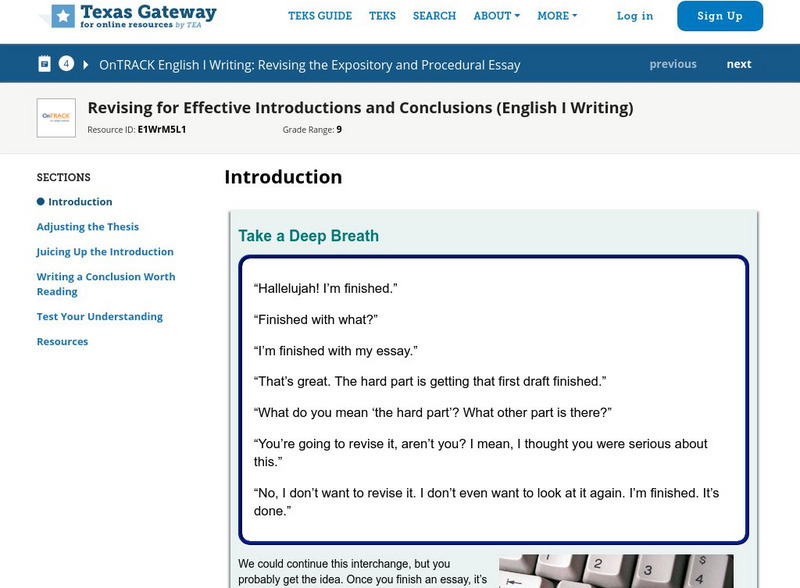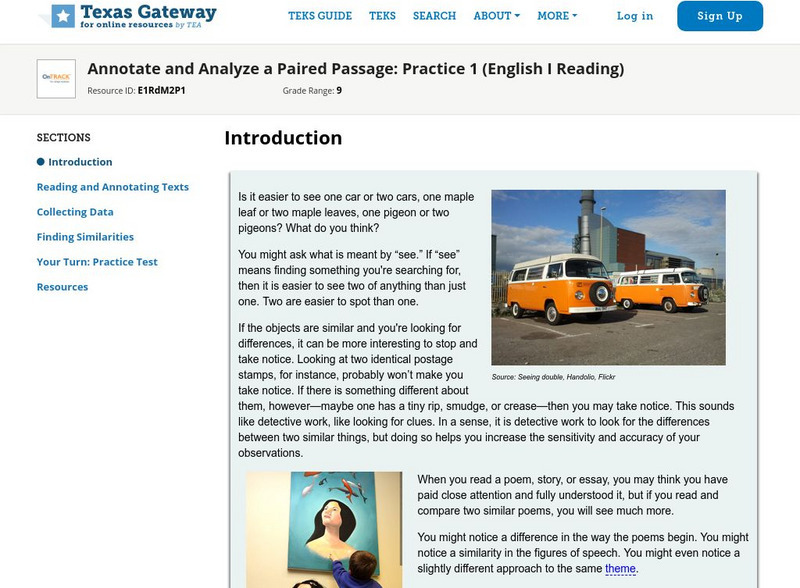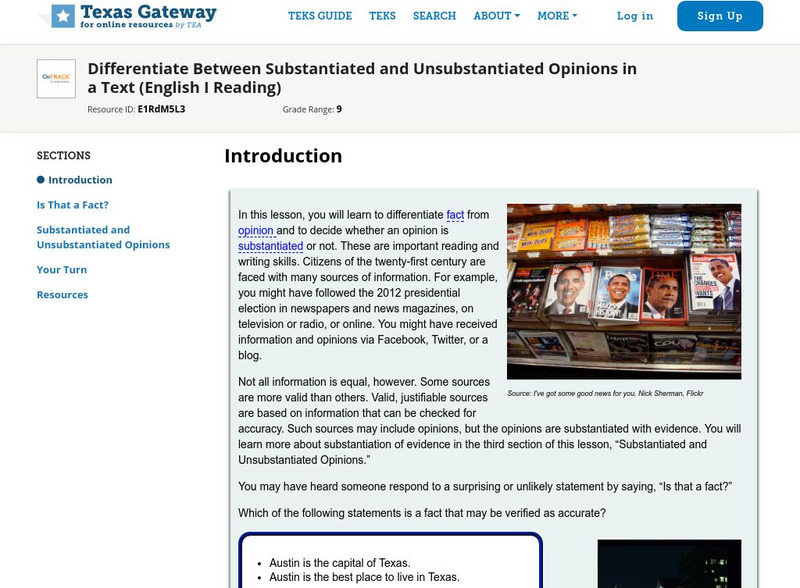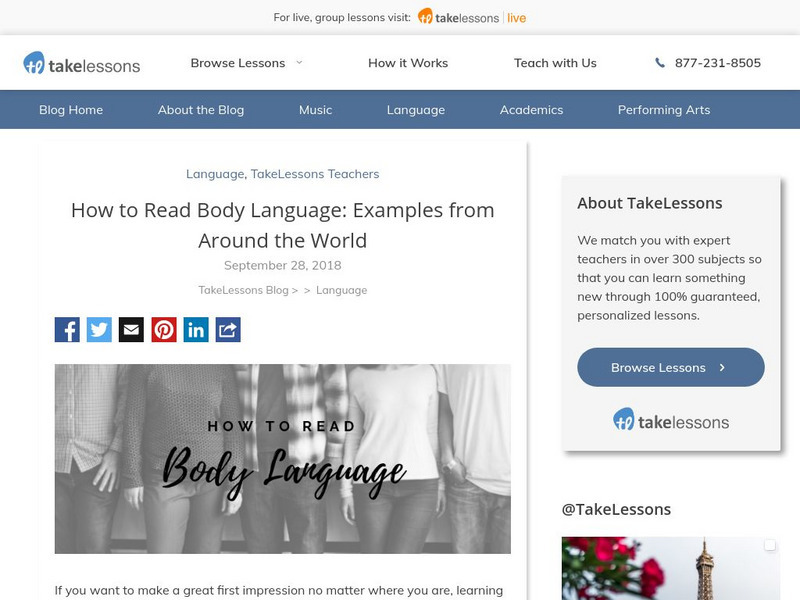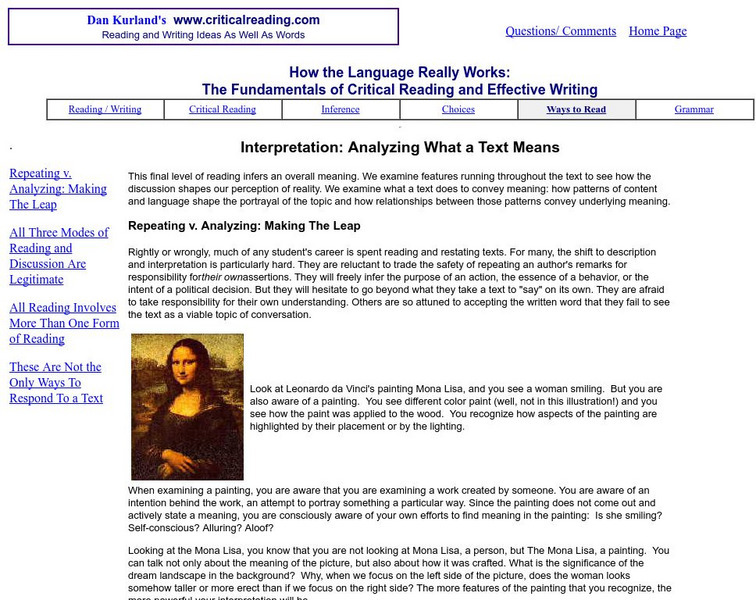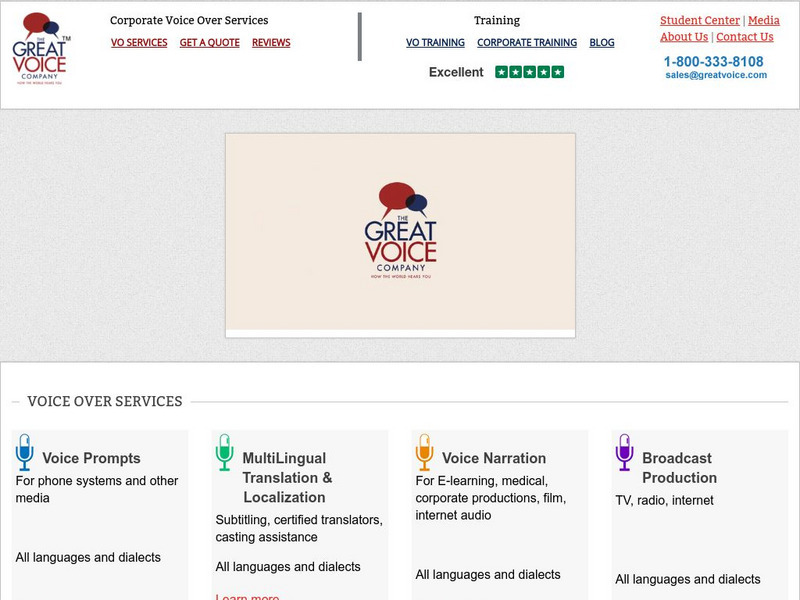Texas Education Agency
Texas Gateway: Revising for Effective Introductions and Conclusions
[Accessible by TX Educators. Free Registration/Login Required] In this lesson, you will learn how to adjust your thesis so it accurately reflects the main idea of your essay. You will learn how to breathe life into a dead introduction...
Texas Education Agency
Texas Gateway: Effective Intro & Conclusion & Variety of Sentence Structures
[Accessible by TX Educators. Free Registration/Login Required] This lesson focuses on the introduction which establishes the context for the information that will form the body of the essay, connecting the conclusion to the introduction,...
Texas Education Agency
Texas Gateway: Annotate and Analyze a Paired Passage: Practice 1
In this lesson, you will read and annotate a pair of texts to make inferences, draw conclusions, and synthesize ideas and details using textual evidence. You are going to look at two texts together to better understand them.
Texas Education Agency
Texas Gateway: Differentiate Between Substantiated and Unsubstantiated Opinions
[Accessible by TX Educators. Free Registration/Login Required] In this lesson, you will learn to differentiate fact from opinion and to decide whether an opinion is substantiated or not. These are important reading and writing skills.
TED Talks
Ted: Ted Ed: How to Use Rhetoric to Get What You Want
How do you get what you want, using just your words? Aristotle set out to answer exactly that question over two thousand years ago with a treatise on rhetoric. Camille A. Langston describes the fundamentals of deliberative rhetoric and...
CommonLit
Common Lit: Text Sets: Argument, Bias, and Persuasion
Collection of 43 Grade-Leveled texts (6-12)on the topic Argument, Bias, and Persuasion. Have students track arguments through texts as they examine logical reasoning, bias, and persuasive techniques such as emotional appeals, character...
Other
Take Lessons: How to Read Body Language: Examples From Around the World
This resource provides several examples of different meanings of various types of body language.
Khan Academy
Khan Academy: Types of Conclusions
You might find it helpful to categorize the kind of conclusion you're dealing with as you approach passages that contain arguments on the LSAT. Your success in analyzing arguments-passages with a conclusion and supporting evidence-starts...
Khan Academy
Khan Academy: Organizing Information Quick Guide
Organizing information questions ask you to understand and analyze how a passage works to make an argument. What is the progression of ideas in the passage? or What is the purpose of a specific paragraph?
Khan Academy
Khan Academy: The Sat Reading Test: Rhetoric
Details about Rhetoric on the SAT Reading Test. One definition of the word rhetoric is "the study of writing or speaking." Rhetoric questions on the Reading Test assess how well you understand the choices that authors make as they...
Khan Academy
Khan Academy: The Sat Reading Test: Information and Ideas
The Information and Ideas category of the SAT Reading Test includes questions that focus on what the passage says (directly or indirectly). To interpret the author's message, you'll need to consider both what's stated and what's implied...
Joe Landsberger
Study Guides & Strategies: Writing Persuasive Essays
This site focuses on the student learning how to write strong persuasive essays. Strategies are provided to help the student complete a persuasive writing assignment.
Houghton Mifflin Harcourt
Holt, Rinehart and Winston: Writer's Guide: Persuasive Essay
Follow the framework on this page to construct a persuasive essay on any topic. Click on Writer's Model in the upper right to see a Shockwave presentation highlighting how to use the suggestions. W.9-10.10 Write Routinely
Georgia Department of Education
Ga Virtual Learning: Narrative Grading Rubric [Pdf]
This site provides four versions of rubrics for narrative writing. The rubrics provide the following assessment categories: ideas, organization, voice, word choice, fluency, conventions. A 6-point rubric, a 5-point rubric, a 4-point...
McGraw Hill
Read: Does Technology Make Us Lazy?
Compare these two passages for some interesting ideas about how technology affects our lives. The questions that follow ask you to identify the main idea from either direct statement or inference.
Harvey Mudd College
Claremont Colleges: Writing an Argument
Brief handout describing different forms of argument for writing.
Other
Teaching Critical Thinking Skills
It is increasingly important to teach students how to develop their critical thinking abilities. This site lists some ideas and strategies that can help teach them to improve their critical thinking skills.
Other
Jewish World Review: Stating the Obvious
Is empathic listening so obvious as to be moronic? Does it work? Here's a dissenting viewpoint of some of the more popular listening, communication, and interpersonal relationship theories.
Other
How to Gesture Effectively
Six rules that apply to anyone seeking to become a dynamic and effective speaker.
Other
Ed u.com: Three Fundamentals of Selling Your Message
This site is provided for by Ed-U.com. Based on the Greek ideas of ethos, logos, and pathos the writer addresses how to adequately persuade an audience.
Other
How the Language Really Works: Restatement
Choosing when to read for simple comprehension is the focus of this brief article.
Other
Critical Reading: How the Language Really Works: Interpretation
In this brief article, the author considers the ways that readers interpret text. An interesting comparison between reading and viewing a painting is worth a look.
Other
Pstcc: Four Principles of Interpersonal Communication
Discusses four inevitable components of interpersonal communication. These principles occur in real interpersonal interaction and are basic to communication.
Other
Great voice.com
Berkley Productions at GreatVoice.com helps train voice professionals. From this page you can link to free subscription forms to two ezines. Under each form are links to sample articles, several of which pertain to tone of voice.


